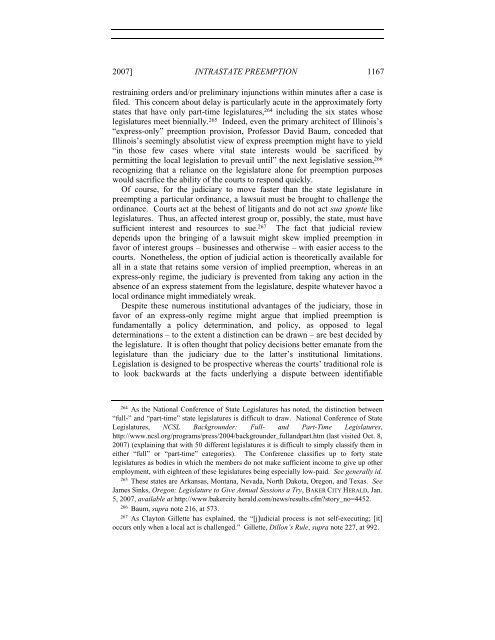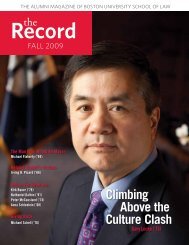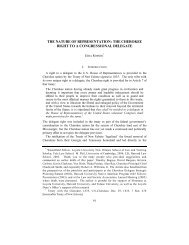INTRASTATE PREEMPTION
INTRASTATE PREEMPTION
INTRASTATE PREEMPTION
- No tags were found...
You also want an ePaper? Increase the reach of your titles
YUMPU automatically turns print PDFs into web optimized ePapers that Google loves.
2007] <strong>INTRASTATE</strong> <strong>PREEMPTION</strong> 1167restraining orders and/or preliminary injunctions within minutes after a case isfiled. This concern about delay is particularly acute in the approximately fortystates that have only part-time legislatures, 264 including the six states whoselegislatures meet biennially. 265 Indeed, even the primary architect of Illinois’s“express-only” preemption provision, Professor David Baum, conceded thatIllinois’s seemingly absolutist view of express preemption might have to yield“in those few cases where vital state interests would be sacrificed bypermitting the local legislation to prevail until” the next legislative session, 266recognizing that a reliance on the legislature alone for preemption purposeswould sacrifice the ability of the courts to respond quickly.Of course, for the judiciary to move faster than the state legislature inpreempting a particular ordinance, a lawsuit must be brought to challenge theordinance. Courts act at the behest of litigants and do not act sua sponte likelegislatures. Thus, an affected interest group or, possibly, the state, must havesufficient interest and resources to sue. 267 The fact that judicial reviewdepends upon the bringing of a lawsuit might skew implied preemption infavor of interest groups – businesses and otherwise – with easier access to thecourts. Nonetheless, the option of judicial action is theoretically available forall in a state that retains some version of implied preemption, whereas in anexpress-only regime, the judiciary is prevented from taking any action in theabsence of an express statement from the legislature, despite whatever havoc alocal ordinance might immediately wreak.Despite these numerous institutional advantages of the judiciary, those infavor of an express-only regime might argue that implied preemption isfundamentally a policy determination, and policy, as opposed to legaldeterminations – to the extent a distinction can be drawn – are best decided bythe legislature. It is often thought that policy decisions better emanate from thelegislature than the judiciary due to the latter’s institutional limitations.Legislation is designed to be prospective whereas the courts’ traditional role isto look backwards at the facts underlying a dispute between identifiable264 As the National Conference of State Legislatures has noted, the distinction between“full-” and “part-time” state legislatures is difficult to draw. National Conference of StateLegislatures, NCSL Backgrounder: Full- and Part-Time Legislatures,http://www.ncsl.org/programs/press/2004/backgrounder_fullandpart.htm (last visited Oct. 8,2007) (explaining that with 50 different legislatures it is difficult to simply classify them ineither “full” or “part-time” categories). The Conference classifies up to forty statelegislatures as bodies in which the members do not make sufficient income to give up otheremployment, with eighteen of these legislatures being especially low-paid. See generally id.265 These states are Arkansas, Montana, Nevada, North Dakota, Oregon, and Texas. SeeJames Sinks, Oregon: Legislature to Give Annual Sessions a Try, BAKER CITY HERALD, Jan.5, 2007, available at http://www.bakercity herald.com/news/results.cfm?story_no=4452.266 Baum, supra note 216, at 573.267 As Clayton Gillette has explained, the “[j]udicial process is not self-executing; [it]occurs only when a local act is challenged.” Gillette, Dillon’s Rule, supra note 227, at 992.









